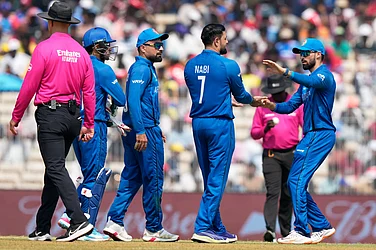CRICKET bonding, in the end, was an idea so hard to swallow that they had to wash it down with Bisleri. Only, it went down the wrong gullet. Finally it was in the silence of the graveyard that an engrossing Test match, which lurched back and forth like a yo-yo, had to be laid to rest. The spectators, in an extended fit of pique, had turned participants and had to be cleared out so that the show could go on.
If Ferozeshah Kotla survived nocturnal visits from the devil with the help of wall-to-wall security cover, Eden Gardens-hosting the tie-opener of the tri-nation Asian Test Championship-lived up to its '96 World Cup semi-final reputation. Then, sensing an Indian defeat, the crowd had let the missiles fly at the Sri Lankan players.
This time the missiles were the same-Bisleri bottles, half-eaten apples, orange peels, even stones. The less lethal ones rained in on day four, after Sachin's run-out-the crowd certain that he was wilfully obstructed by Shoaib Akhtar. Play, called off for an hour, resumed only after Tendulkar went around the stadium pacifying the crowds.
Says Soumitra Bose, a Jadavpur shopkeeper who was sitting in the restive section: 'Players like Ejaz and Youhana didn't help. (They were later scolded by manager Shahryar Khan for making signs at the crowd). The police then made a show of force but that only incensed the crowds more.'
On the fifth day, matters took a turn for the worse after Shahid Afridi scooped up a brilliant catch to dismiss Anil Kumble, the ninth wicket to fall. This time, the crowd employed bits and chips of stadium masonry, along with stones and bricks. One of the groundsmen clearing the debris was hit by a stone. Provoked, they staged a walkout. The previous evening, Calcutta police commissioner Dinesh Vajpai had boasted, 'the police did a good job restricting the entry of disposable items. That's why only plastic bottles and fruits were thrown'. Next day's missiles suggested total security failure.
The Pakistan team, in fact, returned four times to the ground but each time the crowd forced them to return to the pavilion. A majority of the spectators were aghast. 'A minority is holding the game to ransom,' said Shilpa Bannerjee, an 18-year-old student watching the match from the Club House end. But, says Debashish Dutta of Aaj Kal: 'I've always maintained that the Eden crowd has an uncivilised streak. In the '60s when the stadium was set on fire by the crowd, Sir Garfield Sobers had to run towards the Ganges.'
What was unprecedented was the police lathicharge on the crowd after the early lunch to clear the deck for the match to restart. They chased out thousands and restarted the match after three hours of disruption, with only a few thousand remaining at Club House end. Says Arvind Sinha, a spectator: 'They wanted a match minus crowds. They first fail in security, and then browbeat us.'
There were some solutions on offer. 'We should ban plastic bottles inside the stadium, and instead sell water in plastic pouc- hes like we sell milk,' said a photographer. Also a cap on the crowd limit to, say, 50,000 and a stringent control over ticket distribution as thousands of tickets are sold at five-six times their price and spectators therefore go in with a high level of expectation.
Some felt there should be a two-year moratorium on Calcutta hosting another international match. Lamented The Statesman: '(It's) necessary to ensure that Calcutta does not get a crack at its own crumbling image. Even if this means mineral water and soft-drink manufacturers collecting a refundable advance of Rs 100 against the return of a bottle.And if it means a two-three season suspension from international cricket events for Calcutta, so be it.'
Indian skipper Mohammed Azharuddin was bitter at how his once-favourite ground reacted: 'Just because the spectators buy tickets doesn't mean they can do as they wish. Teams can play good or bad, but there ought to be no boorish behaviour.'
But elsewhere, doubts were being cast on the skipper's own motivational levels during play. Said The Asian Age: 'One wonders whether the Indian board has any player accountablity clause in its code of conduct. Azharuddin's conviction level looked suspect, for the manner in which the Indian captain got out, it was evident that he had forgotten his responsibilities.'
The harsh words were not surprising. India had taken hold of the match by the scruff of its neck on day one, having reduced the opposition to 26 for 6. The last time a team lost from such a dream beginning was way back in 1887: then, Australia had England reeling at 17 for 6 and went on to lose the match. For a team that squanders opportunities, victory is an elixir they perhaps don't deserve.
Says Zimbabwean coach Dave Houghton, who was watching: 'India got three big chances. One, when they reduced Pakistan to 26 for 6. Second when they could've taken a big lead. Third when they could've taken early wickets in Pakistan's second innings. Pakistan got just one chance when Shoaib unleashed those ferocious deliveries at Dravid and Sachin. They didn't look back after that.'
But in the end, it was not the cricket that stayed with you but the sight of three cops dragging out a spectator with the tricolour in his hands. Recalls Rajat Mukherjee, who was sitting in H-block: 'The police was just brutal. We had valid tickets, but they caned us. They didn't even spare the ladies.' After Sainiks dug up Kotla, Jyoti Basu had gallantly offered to host all three matches at Eden Gardens. Well, the game did go through, but no one was left to applaud.






















